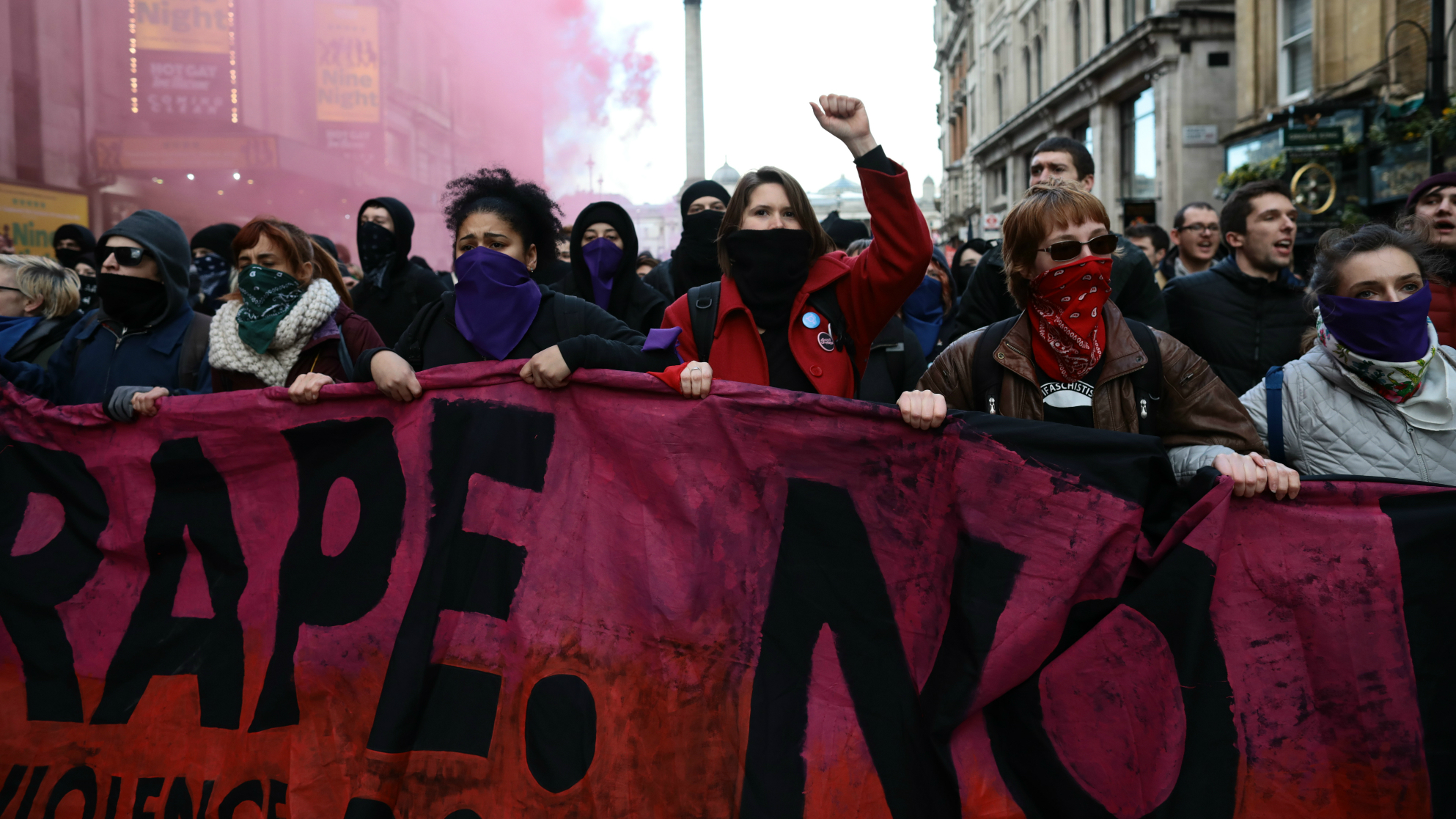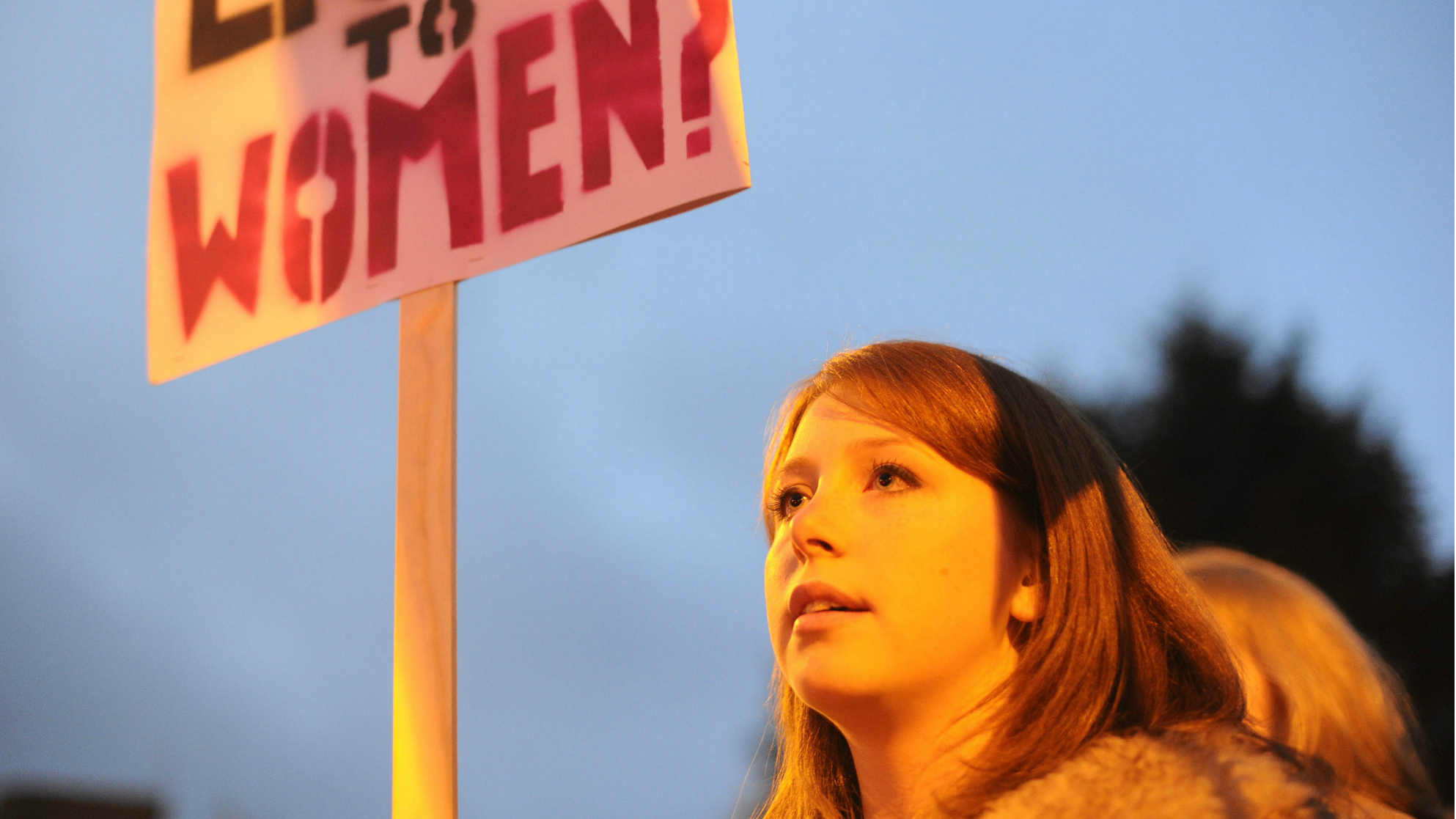Why is rape still so prevalent in 2021?
According to latest figures fewer than one in 60 rape cases lead to a charge in England and Wales. Lizzy Dening reports on the reasons why we're still shockingly at risk


Celebrity news, beauty, fashion advice, and fascinating features, delivered straight to your inbox!
You are now subscribed
Your newsletter sign-up was successful
According to latest figures fewer than one in 60 rape cases lead to a charge in England and Wales. Lizzy Dening reports on the reasons why we're still shockingly at risk
In shocking stats, published by the Guardian this week, rape convictions fell to a record low in 2020, down almost two-thirds on 2016-17. The report, an analysis of Home Office figures seen by the newspaper, revealed that 'fewer than one in 60 rape cases recorded by the police last year resulted in a suspect being charged'. It’s 2021 and we’re slowly getting better at talking about rape, thanks in part to initiatives like #metoo and the Million Women Rise march. But for every forward step, the statistics around sexual violence remain bleak – and things are actually getting worse.
The figures are stark - there were 52,210 rapes recorded by police in England and Wales in 2020, only 843 resulted in a charge or a summons – a rate of 1.6%. Undoubtedly, these low rape charges and conviction figures will put pressure on the government to radically overhaul the treatment of rape by the criminal justice system. Commissioned two years ago, there is high hopes for hugely-anticipated end-to-end review which has scrutinised how rape is investigated and prosecuted, now due to be published imminently.
It’s estimated that one in five women and 4% of men have experienced some type of sexual assault since the age of 16, with roughly 3.1% of women experiencing a sexual assault each year. Meanwhile, rape cases referred by police to the Crown Prosecution Service have fallen by 32%, and convictions have dropped by 21%, in the year leading up to September 2019. So what exactly is going on?
A massive part of the problem are the assumptions most people make about sexual violence – what it looks like and who it affects. 'Sexual violence is a persistent, and possibly growing, scourge on our society,' says Vivienne Hayes MBE, CEO of the Women’s Resource Centre. 'We know that it is overwhelmingly experienced by women and girls, though not exclusively. We also know it is not only used as a ‘weapon of war’ but is more often than not found within families and friendships.'
Here are some of the main ways in which ‘rape culture’ is holding survivors back from justice – and leaving perpetrators out on the streets.
Silenced voices
Historically, the voices of women and girls have always been ignored – and in many ways we’re still living in the past. 'It is imperative that we start to remove the silence so often surrounding sexual violence; believe girls when they disclose it; and take a much wider view on how to tackle it,' says Hayes. 'Many people, understandably, don’t want to raise this issue, as it reveals a side of humans that is quite frankly almost unbelievable – men raping babies and toddlers; who wants to even acknowledge that happens?' While we’re not necessarily suggesting graphic stories at the dinner table, a little bit of shared awareness and compassion go a long way to making survivors feel safe enough to share their stories.
Celebrity news, beauty, fashion advice, and fascinating features, delivered straight to your inbox!
'Rape culture and victim blaming are huge, and both really silence victims and protect perpetrators,' agrees survivor Madeleine Black, author of Unbroken. 'So in my case [having been gang raped as a teenager] it was: ‘you were drinking, what did you expect?’ This trickles down, and we’d be naïve to think juries don’t come with these same preconceived ideas. We’re living with these attitudes all the time.'
The role of rape culture
A lot gets blamed on ‘rape culture’ – but what exactly does that mean? In short, it’s an attitude that, arguably, permeates almost everything we experience. From locker-room ‘banter’ to unequal pay, it’s the idea that women and girls are somehow lesser compared to the desires of men. Unsurprisingly, many experts believe this is a major factor in our widespread sexual violence problem.
'Although we’ve had, for over 15 years, a clear definition of ‘consent’ in law, and in fact have some of the most progressive sexual violence laws in Europe, we haven’t seen a culture shift alongside that’s essential to embed change,' says Katie Russell, Media and Comms Co-ordinator for Rape Crisis England and Wales. 'There’s a widespread lack of understanding about healthy sexual relationships.'

One possible way to start to change this could be, according to Katie, a high profile education campaign, aimed at changing the narrative around victim blaming: 'A public, government-funded awareness campaign around victim blaming myths and attitudes would be amazing. We’ve already seen what an effect campaigns can have from issues such as wearing a seatbelt, smoking in pubs and drink driving.'
And what about changing attitudes in the courtroom? 'It is critical that those of us who work to bring offenders to justice continue to challenge the myths and stereotypes which surround sexual offences,' says Siobhan Blake, the Chief Crown Prosecutor for CPS Mersey Cheshire, and the lead for rape cases across the Crown Prosecution Service. 'Recent high profile cases demonstrate that offenders operate in many guises and all environments, the traits they have in common is their total disrespect they have for their victims and their cynical exploitation of vulnerability be that physical, emotional or environmental.'
Could ‘consent education’ help?
Another solution posed by just about everyone involved in sexual violence charities and organisations is early years education.
'Tackling the rape culture children grow up in is imperative,' says Hayes. 'I would dearly love to see nurseries and schools prioritising human rights, human love and care, respect of difference and addressing the inequality in our society head on.' But what exactly does that look like when it comes to very small children? 'A simple start would be for the current ‘disease of blue and pink’ to be ended. For children allowed to access toys and books that challenge the damaging gender stereotyping which actually promote a culture where boys and girls are unequal.'
Black agrees that early education is crucial: 'It starts at nursery level – we should be teaching children about consent and what healthy relationships look like. Not forcing them to sit on someone’s knee or kiss someone if they don’t want to, and educating them to listen to their gut.'
Change is imperative
Whatever your gender or background, living in a rape culture is harmful, and it’s in all of our best interests to start calling out victim blaming, pressuring the government to address issues of inequality, and believing rape survivors.
'Sexual violence is difficult for many people to talk about, but other topics have been similarly laden with stigma,' says Russell. 'For example, HIV, and now people’s attitudes towards testing and treatment have shifted. Only feminist activists are really talking about sexual violence, and sadly we are sometimes shouted down or characterised as extremists.
'It’s such a crashing and desperate situation and it requires some radical solutions. If any other serious crime had such a massive effect on people’s lives, careers, relationships and health, and was consistently going unpunished, it would be considered a national emergency. The fact that it’s a crime that disproportionately affects women and girls, and is perpetrated by men – we can’t ignore the sexism in the response.'
For help and advice please contact: *Rape Crisis England and Wales *Rape Crisis Scotland *Rape Crisis Network Ireland
Maria Coole is a contributing editor on Marie Claire.
Hello Marie Claire readers – you have reached your daily destination. I really hope you’re enjoying our reads and I'm very interested to know what you shared, liked and didn’t like (gah, it happens) by emailing me at: maria.coole@freelance.ti-media.com
But if you fancy finding out who you’re venting to then let me tell you I’m the one on the team that remembers the Spice Girls the first time round. I confidently predicted they’d be a one-hit wonder in the pages of Bliss magazine where I was deputy editor through the second half of the 90s. Having soundly killed any career ambitions in music journalism I’ve managed to keep myself in glow-boosting moisturisers and theatre tickets with a centuries-spanning career in journalism.
Yes, predating t’internet, when 'I’ll fax you' was grunted down a phone with a cord attached to it; when Glastonbury was still accessible by casually going under or over a flimsy fence; when gatecrashing a Foo Fighters aftershow party was easy-peasy-lemon-squeezy and tapping Dave Grohl on the shoulder was... oh sorry I like to ramble.
Originally born and bred in that there Welsh seaside town kindly given a new lease of life by Gavin & Stacey, I started out as a junior writer for the Girl Guides and eventually earned enough Brownie points to move on and have a blast as deputy editor of Bliss, New Woman and editor of People newspaper magazine. I was on the launch team of Look in 2007 - where I stuck around as deputy editor and acting editor for almost ten years - shaping a magazine and website at the forefront of body positivity, mental wellbeing and empowering features. More recently, I’ve been Closer executive editor, assistant editor at the Financial Times’s How To Spend It (yes thanks, no probs with that life skill) and now I’m making my inner fangirl’s dream come true by working on this agenda-setting brand, the one that inspired me to become a journalist when Marie Claire launched back in 1988.
I’m a theatre addict, lover of Marvel franchises, most hard cheeses, all types of trees, half-price Itsu, cats, Dr Who, cherry tomatoes, Curly-Wurly, cats, blueberries, cats, boiled eggs, cats, maxi dresses, cats, Adidas shelltops, cats and their kittens. I’ve never knowingly operated any household white goods and once served Ripples as a main course. And finally, always remember what the late great Nora Ephron said, ‘Everything is copy.’
